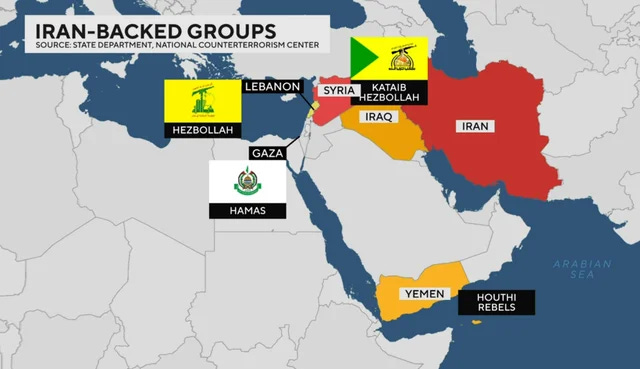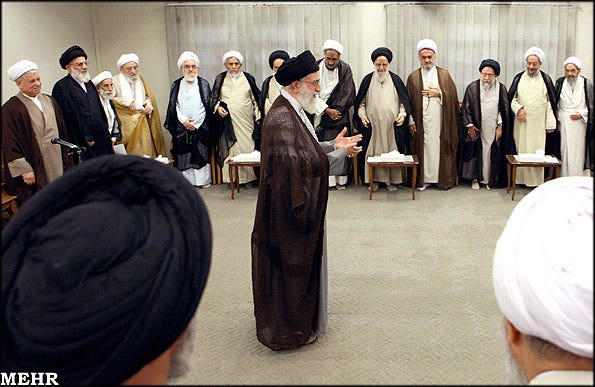Iran is only a threat if we let it go nuclear
Tehran is largely a paper tiger with increasingly limited capacity, but that can all change if the ayatollah's regime acquires nukes.
Iran's potential as a global threat in 2025 depends entirely on the ayatollah’s regime acquiring a nuclear weapon. This may surprise those who adhere to the foreign policy establishment’s views, but it’s a cold, hard geopolitical reality. Gaining nuclear capability would transform Iran from a paper tiger into a genuine menace overnight. Given the fundamentalist ideology dominating Tehran’s leadership, the Cold War logic of mutually assured destruction, which has deterred nuclear weapon use since World War II, would not restrain Iran. Allowing them to obtain nukes would be a gamble with potentially catastrophic stakes.
Since President Donald Trump’s second inauguration, the political right has remained divided on how to address the Iran issue. But first, let’s familiarize ourselves with the realities on the ground in Tehran and how they inform the policies and geopolitical interests of America and its allies on the global stage.
Unlock the Power of Your Metabolism
Lumen helps you breathe into better metabolic health by giving you personalized insights into your metabolism. Whether your goal is weight management, improved athletic performance, or enhanced energy and longevity, Lumen empowers you to make smarter, data-driven decisions that optimize your health.
Make this the season you achieve your goals with Lumen.
In February, President Trump restored America’s maximum pressure campaign from term one against the mullahs that rule Iran, reversing the Biden Administration’s appeasement-focused “strategy” vis-a-vis Iran.
Putting aside its nuclear program, Tehran is more boxed in, both politically and militarily, than it has been in several years.
The restored Trump sanctions followed four years of the Biden Administration empowering Tehran by rolling back sanctions and granting its government tens of billions of dollars in access to previously frozen cash reserves. The mullahs used this money to secure the internal power of the Islamic regime that rules a very politically diverse country. Other funds went toward empowering its proxies abroad, such as Hezbollah in Lebanon, the Houthis in Yemen, and several Palestinian terrorist factions.
The Israelis, to their great credit, have spent the past couple of years mopping the floor with Iran’s proxy forces and aligned militant network. Both Hamas and Hezbollah are severely handicapped (Hamas has been almost entirely incapacitated), and the Trump Administration is in the process of putting the Houthi jihadists in Yemen on their back foot while breaking their grip over critical sea lanes.
Today, Iran is severely limited in what it can achieve in the region without deploying its conventional military forces, which are, in their own right, both technologically and intellectually handicapped. While there are no indications that the regime itself is in danger of being toppled, there doesn’t seem to be much capacity in Tehran for continuing to finance and weaponize jihadist factions abroad, given their continually limited resources. Sure, Iran still has some trading partners, but so does Cuba, and at least three-plus more years of harsh sanctions will continue to mitigate the military strength of the regime.
But that can all change in a moment’s notice. Should Iran successfully acquire a nuclear weapon, Tehran will have obtained the ultimate form of geopolitical leverage that is available on this earth today. See: North Korea. The cascading effects would quickly become a nightmare for global stability, as an Iranian nuclear weapons program would very likely spark a nuclear arms race in the greater region. If Iran acquires nukes, the Saudis, and probably Turkey, too, would make it their mission to go nuclear in a flash.
In the West, many analysts have at least subconsciously bought into the idea of Mutually Assured Destruction (MAD), the doctrine that explains why the planet wasn’t turned into dust during the Cold War. Yet it would be quite the stretch to apply MAD doctrine to a country led by Twelver Shia lunatics that follow an Islamic eschatology which seeks to bring about the End Times. I don’t know about you, but I’d rather not test whether the mullahs are legit enough to use a nuclear weapon with the hopes of expediting armageddon. Sure, even jihadists can sometimes be rational actors, but it’s probably not worth betting our civilization on that thesis coming to fruition.
Now, the political right is considerably divided over the Iran issue. Th
There are many factions to consider here, but the real divide is over whether one would support a potential military campaign, should nonkinetic denuclearization efforts fail, to eliminate Iran’s nuclear capacity.
A significant issue with the debate is how it’s being framed by major commentators from the pro-Tehran/indifferent to Tehran faction.
They almost unanimously position a decapitating series of strikes on Iran’s nuclear facilities as a spark that would ignite a regional war. However, this analysis is entirely backwards.
Iran is almost all bark and no bite. Tehran is a paper tiger through and through, and the only thing that would make the ayatollah’s regime become a force to be reckoned with is through the acquisition of nukes. Eliminating the nuclear threat means eliminating Iran’s only opportunity to become a global powerbroker. In the event of a series of strikes to take out Iran’s nuclear facilities, Tehran may very well respond, but with the power of a mid-tier military that has already bit off far more than it can chew.
Now, I’m not going to pretend to be some kind of nuclear enrichment expert here. However, Iran has established significant physical infrastructure that is purposed with developing a nuclear weapons program. Should that physical infrastructure no longer exist, we don’t need to have academic debates over “how close” Iran is to nukes, because it moves the discussion from projections and theories to an impossibility.
As the Trump Administration proceeds forward with its nuclear talks, it’s always worth remembering that Iran is only a threat if we let it become one.







Why haven't there been any new posts?
I'm unsubscribing for now